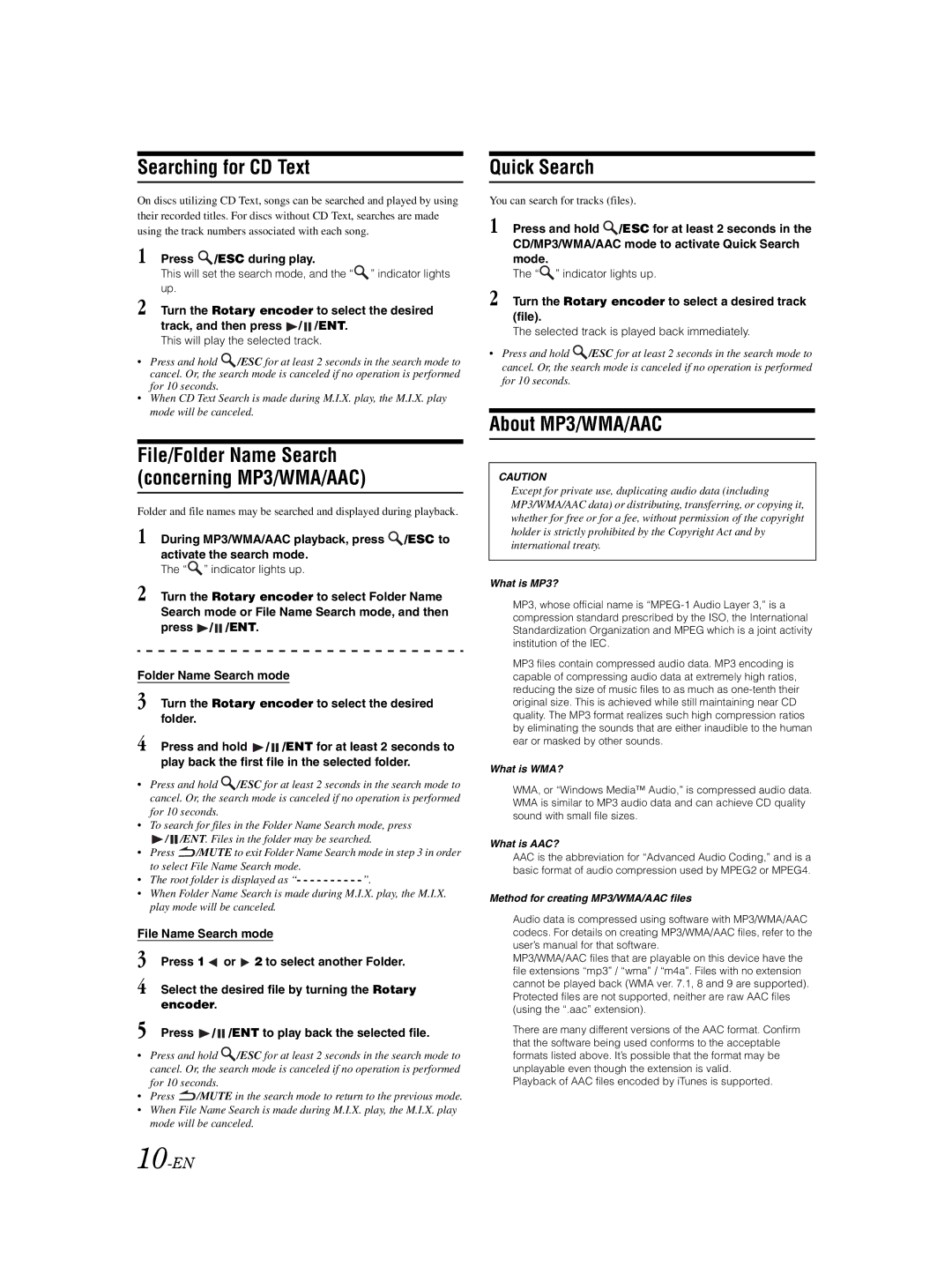
Searching for CD Text
On discs utilizing CD Text, songs can be searched and played by using their recorded titles. For discs without CD Text, searches are made using the track numbers associated with each song.
1 Press ![]() /ESC during play.
/ESC during play.
This will set the search mode, and the “![]() ” indicator lights up.
” indicator lights up.
2 Turn the Rotary encoder to select the desired track, and then press ![]() /
/ ![]() /ENT.
/ENT.
This will play the selected track.
•Press and hold ![]() /ESC for at least 2 seconds in the search mode to cancel. Or, the search mode is canceled if no operation is performed for 10 seconds.
/ESC for at least 2 seconds in the search mode to cancel. Or, the search mode is canceled if no operation is performed for 10 seconds.
•When CD Text Search is made during M.I.X. play, the M.I.X. play mode will be canceled.
File/Folder Name Search (concerning MP3/WMA/AAC)
Folder and file names may be searched and displayed during playback.
1 During MP3/WMA/AAC playback, press ![]() /ESC to activate the search mode.
/ESC to activate the search mode.
The “![]() ” indicator lights up.
” indicator lights up.
2 Turn the Rotary encoder to select Folder Name Search mode or File Name Search mode, and then press ![]() /
/ ![]() /ENT.
/ENT.
Folder Name Search mode
3 Turn the Rotary encoder to select the desired folder.
4 Press and hold ![]() /
/ ![]() /ENT for at least 2 seconds to play back the first file in the selected folder.
/ENT for at least 2 seconds to play back the first file in the selected folder.
•Press and hold ![]() /ESC for at least 2 seconds in the search mode to cancel. Or, the search mode is canceled if no operation is performed for 10 seconds.
/ESC for at least 2 seconds in the search mode to cancel. Or, the search mode is canceled if no operation is performed for 10 seconds.
•To search for files in the Folder Name Search mode, press
![]() /
/ ![]() /ENT. Files in the folder may be searched.
/ENT. Files in the folder may be searched.
•Press ![]() /MUTE to exit Folder Name Search mode in step 3 in order to select File Name Search mode.
/MUTE to exit Folder Name Search mode in step 3 in order to select File Name Search mode.
• The root folder is displayed as “ | ”. |
•When Folder Name Search is made during M.I.X. play, the M.I.X. play mode will be canceled.
File Name Search mode
3 | Press 1 | or 2 to select another Folder. |
4 | Select the desired file by turning the Rotary | |
| encoder. |
|
5 | Press / | /ENT to play back the selected file. |
•Press and hold ![]() /ESC for at least 2 seconds in the search mode to cancel. Or, the search mode is canceled if no operation is performed for 10 seconds.
/ESC for at least 2 seconds in the search mode to cancel. Or, the search mode is canceled if no operation is performed for 10 seconds.
•Press ![]() /MUTE in the search mode to return to the previous mode.
/MUTE in the search mode to return to the previous mode.
•When File Name Search is made during M.I.X. play, the M.I.X. play mode will be canceled.
Quick Search
You can search for tracks (files).
1 Press and hold ![]() /ESC for at least 2 seconds in the CD/MP3/WMA/AAC mode to activate Quick Search mode.
/ESC for at least 2 seconds in the CD/MP3/WMA/AAC mode to activate Quick Search mode.
The “![]() ” indicator lights up.
” indicator lights up.
2 Turn the Rotary encoder to select a desired track (file).
The selected track is played back immediately.
•Press and hold ![]() /ESC for at least 2 seconds in the search mode to cancel. Or, the search mode is canceled if no operation is performed for 10 seconds.
/ESC for at least 2 seconds in the search mode to cancel. Or, the search mode is canceled if no operation is performed for 10 seconds.
About MP3/WMA/AAC
CAUTION
Except for private use, duplicating audio data (including MP3/WMA/AAC data) or distributing, transferring, or copying it, whether for free or for a fee, without permission of the copyright holder is strictly prohibited by the Copyright Act and by international treaty.
What is MP3?
MP3, whose official name is
MP3 files contain compressed audio data. MP3 encoding is capable of compressing audio data at extremely high ratios, reducing the size of music files to as much as
What is WMA?
WMA, or “Windows Media™ Audio,” is compressed audio data. WMA is similar to MP3 audio data and can achieve CD quality sound with small file sizes.
What is AAC?
AAC is the abbreviation for “Advanced Audio Coding,” and is a basic format of audio compression used by MPEG2 or MPEG4.
Method for creating MP3/WMA/AAC files
Audio data is compressed using software with MP3/WMA/AAC codecs. For details on creating MP3/WMA/AAC files, refer to the user’s manual for that software.
MP3/WMA/AAC files that are playable on this device have the file extensions “mp3” / “wma” / “m4a”. Files with no extension cannot be played back (WMA ver. 7.1, 8 and 9 are supported). Protected files are not supported, neither are raw AAC files (using the “.aac” extension).
There are many different versions of the AAC format. Confirm that the software being used conforms to the acceptable formats listed above. It’s possible that the format may be unplayable even though the extension is valid.
Playback of AAC files encoded by iTunes is supported.
